|
|
|
Sort Order |
|
|
|
Items / Page
|
|
|
|
|
|
|
| Srl | Item |
| 1 |
ID:
155404
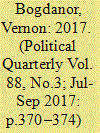

|
|
|
|
|
| Summary/Abstract |
The 2017 general election was one which almost everybody lost. When she called it, Theresa May declared that the country was united, but the politicians divided. The election was intended to endorse that proposition. It did not. It showed that the country was just as divided as the House of Commons, if not more so—on generational lines (young versus old); along cultural or meritocratic lines (the exam-passing classes versus the rest), for it may be that education rather than class is now the main cleavage in British politics; and, above all, on the toxic issue of Europe. The election, far from settling the European issue, has reopened it.
|
|
|
|
|
|
|
|
|
|
|
|
|
|
|
|
| 2 |
ID:
155401
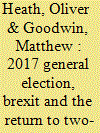

|
|
|
|
|
| Summary/Abstract |
The outcome of the 2017 general election—a hung parliament—defied most predictions. In this article, we draw on aggregate-level data to conduct an initial exploration of the vote. What was the impact of Brexit on the 2017 general election result? What difference did the collapse of UKIP make? And what was the relative importance of factors such as turnout, education, age and ethnic diversity on support for the two main parties? First, we find that turnout was generally higher in more pro-remain areas, and places with high concentrations of young people, ethnic minorities and university graduates. Second, we find that the Conservatives made gains in the sort of places that had previously backed Brexit and previously voted for UKIP. But, third, we find that the gains the Conservatives made from the electoral decline of UKIP were offset by losses in the sort of places that had previously supported the Conservatives, particularly areas in southern England with larger numbers of graduates. The implication of these findings is that while a Brexit effect contributed to a ‘realignment on the right’, with the Conservative strategy appealing to people in places that had previously voted for UKIP, this strategy was not without an electoral cost, and appears to have hurt the party in more middle class areas.
|
|
|
|
|
|
|
|
|
|
|
|
|
|
|
|
| 3 |
ID:
155402
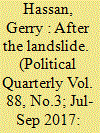

|
|
|
|
|
| Summary/Abstract |
The pre-election conventional wisdom about Scotland (both inside the country and even more in the rest of the UK) was that the SNP seemed to carry all before it. A little less impressively than previously, but the party still dictated the debate and shaped the political terrain, and had an aura of invincibility along with an inevitability about Scottish independence.
|
|
|
|
|
|
|
|
|
|
|
|
|
|
|
|
| 4 |
ID:
155414
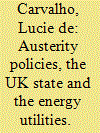

|
|
|
|
|
| Summary/Abstract |
In 2008, the economic downturn coincided with a major shift in the energy sector paradigm. This state of emergency forced the UK government to try to steer the objectives of its major energy players. This crisis put the UK state's capacity to influence its mostly privately-owned energy sector to the test. Using the example of energy utilities, this article aims to explore whether the austerity agenda impacted the relationship between the UK state and its public services. The purpose is to determine whether current multiple crises have forced the UK state to adopt an exceptionally interventionist approach that doesn't tally with the austerity agenda, or whether these crises merely revealed dynamics which had been underlying in the management of its energy utilities since the beginning of the neo-liberal era.
|
|
|
|
|
|
|
|
|
|
|
|
|
|
|
|
| 5 |
ID:
155424


|
|
|
|
|
| Summary/Abstract |
In this article we explore the implications of Brexit for the UK and the EU's development policies and strategic directions, focusing on the former. While it is likely that the operational process of disentangling the UK from the various development institutions of the EU will be relatively straightforward, the choices that lie ahead about whether and how to cooperate thereafter are more complex. Aid and development policy touches on a wide range of interests—security, trade, climate change, migration, gender rights, and so on. We argue that Brexit will accelerate existing trends within UK development policy, notably towards the growing priority of private sector-led economic growth strategies and blended finance tools. There are strong signals that UK aid will be cut, as successive secretaries of state appear unable to persuade a substantial section of the public and media that UK aid and development policy serves UK interests in a variety of ways.
|
|
|
|
|
|
|
|
|
|
|
|
|
|
|
|
| 6 |
ID:
155419


|
|
|
|
|
| Summary/Abstract |
Since the establishment of devolution in 1999, Northern Ireland's power-sharing governments have been fragile and prone to crisis. However, following a decade of relative stability and cooperation between Nationalists and Unionists at Stormont, hopes were high that the devolved arrangements had finally become embedded and more resistant to collapse. This optimism was dashed when Sinn Féin brought down the devolved institutions in January 2017. A snap election once again returned the Democratic Unionist Party (DUP) and Sinn Féin as the largest parties and their inability to form a government resulted in yet another political stalemate. This article begins by outlining the pattern of political crises in Northern Ireland and assesses both the trigger factors and the responses. It then goes beyond the most obvious explanation for this continuing instability—that of the deep sectarian based divisions—and points to a number of other reasons for the volatility. These include issues such as the incomplete implementation of previous agreements, the impact of broader UK policies and the shadow of Direct Rule.
|
|
|
|
|
|
|
|
|
|
|
|
|
|
|
|
| 7 |
ID:
155418
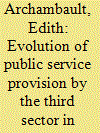

|
|
|
|
|
| Summary/Abstract |
Public services have been externalised, in part, to the non-profit sector in France and in the United Kingdom. This article begins by reviewing relations between the public and non-profit sector in France before 2008, and its evolution since. This has been characterised by the slow reduction of public funding, the adaptation of non-profit associations and organisations, and their clearer positioning within a wider ‘social and solidarity economy’, which was consolidated by a framework Law in 2014. The article then examines the current sharing of responsibilities between the public and non-profit sectors in education, health and social services, pointing to the diverse historical and political conditions which have led to this shared organisation.
|
|
|
|
|
|
|
|
|
|
|
|
|
|
|
|
| 8 |
ID:
155415
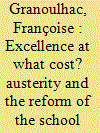

|
|
|
|
|
| Summary/Abstract |
The reform of the school system, which has been conducted by the Coalition and Conservative governments since 2010, has largely been austerity-driven. In spite of the governments’ pledge to protect their budgets, schools have been severely hit by spending cuts. The reform programme has itself been integral to the fiscal consolidation plans by promoting a more cost-effective system of state schooling. This article discusses the relationship between austerity and reform, and looks at the consequences for the concept of public service. Some specific aspects of the new institutional framework are examined, especially the creation of an independent state sector made up of academies and free schools, which has entrenched the involvement of private sector firms in education. The overhaul of the school system, which started nearly thirty years ago, has now reached a new decisive stage. However, considering the complex relationship between multiple actors and the opposing forces at work, one cannot say with any certainty that it will cause the demise of public service state education.
|
|
|
|
|
|
|
|
|
|
|
|
|
|
|
|
| 9 |
ID:
155416


|
|
|
|
|
| Summary/Abstract |
This article explores how a devolved government in a small country, faced with external constraints beyond its immediate control, can deploy policy resources to shape a distinctive approach to public services. We analyse recent homelessness policy in Wales using the NATO (Nodality, Authority, Treasure, Organisation) typology of tools of government proposed by Hood and Margetts, and show how this can be applied usefully to understand the choices that governments must make in conducting relationships with other institutions. We conclude that a combination of Nodality and Authority provide powerful resources for a subnational government which has only limited formal powers and fiscal autonomy.
|
|
|
|
|
|
|
|
|
|
|
|
|
|
|
|
| 10 |
ID:
155410
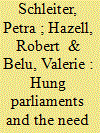

|
|
|
|
|
| Summary/Abstract |
The general elections of 2017 and 2010 produced hung parliaments in which no single party could command an overall majority; in May 2015 the UK only narrowly avoided that outcome. When a parliament is hung, more than one potential government can be viable, and the constitutional rules that determine who has the first right to form the government can thus have a decisive influence on which government forms. In the past, the UK has applied several potentially contradictory rules (based on conventions and principles), which do not all follow an equally democratic logic. This status quo is problematic because it can generate political controversy and uncertainty, in addition to jeopardising the Monarch's role in the government formation process. A reform that enables parliament to elect the leader who will be tasked with the formation of the next government would resolve these problems and provide constitutional clarity.
|
|
|
|
|
|
|
|
|
|
|
|
|
|
|
|
| 11 |
ID:
155405
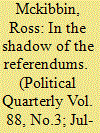

|
|
|
|
|
| Summary/Abstract |
This was the most interesting election of my lifetime, and in many ways the most surprising. Quite why what happened actually happened, we don't altogether know. For the most part, we can only speculate. The most remarkable of the election's results was the return of the two-party system to England. The two major parties together won eighty-eight per cent of the votes cast—a figure not seen since the 1970s. At one go, this reverses a tendency apparent since the late 1950s, which was for the proportion of the vote won by the Conservatives and Labour to fall—not steadily, but remorselessly. Furthermore, there were perfectly good historical and sociological reasons for this; and of the two parties, they harmed Labour most. At this election, the increase of the Tory vote was the easiest to explain—or apparently the easiest. The most difficult to explain was the extraordinary rise in the Labour vote. International experience, as well as our own, suggested that the condition of the social democratic parties everywhere was almost terminal: the collapse of the French Socialist Party merely the most extreme example of this. It is true that the evidence could be a bit mixed. The Australian Labor Party has staged an unexpectedly strong recovery in the last couple of years, but there was little to suggest that the British Labour Party had done so.
|
|
|
|
|
|
|
|
|
|
|
|
|
|
|
|
| 12 |
ID:
155407


|
|
|
|
|
| Summary/Abstract |
the election of 8 June was supposed to be about Brexit. In actuality, the election morphed into one about austerity and how not to fund social care for an ageing population. Put more schematically, it became an election borne of the extraordinary consequences of the 2008 crash and what they have entailed for intergenerational conflict in an ageing society. Although Brexit has its own historical origins,1 it is also a singular contingency in a political world that is being shaped by structural forces set in place by the policy response to 2008. In this political world, politicians cannot frame what elections will be about—even when the stakes are as high as they are for Brexit. Instead, the structural economic forces at work will keep manifesting themselves—even when, on the surface of what happens, they are difficult to see.
|
|
|
|
|
|
|
|
|
|
|
|
|
|
|
|
| 13 |
ID:
155409


|
|
|
| 14 |
ID:
155417


|
|
|
|
|
| Summary/Abstract |
Riots, social exclusion, and endless improvement programmes have been a feature of the poorest neighbourhoods in France and England for the last thirty-five years or more—particularly focused on large social housing estates. Programmes of improvement have followed similar paths in each country, with mixed success. This article sets out a short overview of these programmes in each country, then contrasts and compares the objectives, approaches, and outcomes. Each country has key elements of inter-agency working, local and resident participation and planning, large-scale building rehabilitation and demolition programmes, though the French system is more often based on specific local contracts between cities and the central departments. Similar evaluation outcome indicators and frameworks of ‘floor’ and ‘gap’ targets have been set, although evidence of success is limited and, particularly in France, there has been considerable criticism of the approach and framework. In parallel, however, the concept of ‘mixed communities’ has emerged as an alternative strategic approach—intuitively reasonable, politically popular, but lacking an evidence base and often ineffective in dealing with poverty.
|
|
|
|
|
|
|
|
|
|
|
|
|
|
|
|
| 15 |
ID:
155400


|
|
|
|
|
| Summary/Abstract |
at the outset of the 2017 election campaign, there seemed to be a good chance that the Labour party would be broken—possibly irreparably—on the anvil of nationalism. After all, that was why Theresa May had called the election. Enormous credit is therefore due to Jeremy Corbyn and the Labour left for running an excellent campaign that capitalised on the abject weaknesses of the Conservatives and ultimately saved Labour from what many people—including me—thought would be a shattering historic defeat. After two years of bleak political news, the forces of conservatism in Britain have finally lost some ground. Much conventional wisdom now looks questionable as a result of the election, but I want to focus here on one point that raises some challenges for all parts of the Labour party, including for Jeremy Corbyn and the left.
|
|
|
|
|
|
|
|
|
|
|
|
|
|
|
|
| 16 |
ID:
155422
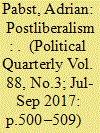

|
|
|
|
|
| Summary/Abstract |
Brexit and support for anti-establishment insurgencies suggest that British politics is moving away from the old left–right opposition towards a new divide between the defenders and detractors of progressive liberalism. As this article suggests, progressive liberalism differs significantly from both classical and new liberalism. It fuses free-market economics with social egalitarianism and identity politics. Both the hard left and the radical right reject this combination and want to undo a number of liberal achievements.
|
|
|
|
|
|
|
|
|
|
|
|
|
|
|
|
| 17 |
ID:
155413


|
|
|
|
|
| Summary/Abstract |
Public services—in the UK and elsewhere—are under considerable pressure, not just from austerity, but also from a variety of social, demographic and technological changes (in effect ‘austerity plus’). In this context, three broad options are open to policy-makers: continue with tried-and-tested approaches while spending less money, which in the UK means a reliance on ‘New Public Management’ (NPM); withdraw completely from certain public services; or develop new approaches to public administration. We argue that all of these approaches have been attempted in recent years, but it is the final option that is most interesting and potentially the most beneficial. In this article, we examine experiments with these new approaches in responding to ‘austerity plus’. In particular, we examine various attempts at ‘collaboration’ in public services and discuss the risks associated with them. We conclude by setting out the extent to which policy-makers have moved beyond NPM and suggesting some of the benefits that this could bring.
|
|
|
|
|
|
|
|
|
|
|
|
|
|
|
|
| 18 |
ID:
155412


|
|
|
| 19 |
ID:
155421


|
|
|
|
|
| Summary/Abstract |
The ride-hailing company Uber has achieved extremely rapid global expansion by means of outmanoeuvring governments, regulators and competitors. The rise of the company has been based on a deliberate strategy of acting as a market disruptive innovator through a user friendly technology and making use of the ‘sharing economy’. These attributes are not unique, but are distinctively augmented by a relentless expansionary ambition and an ability to maintain the capacity to innovate. Uber has generated great political controversy, but the challenge for governments and regulators is to embrace the benefits of the disruptive innovator, while adopting an approach that takes into account the full range of impacts. For Uber, the challenge is to maintain its expansionary style as a disruptive innovator, while also redefining on its terms the political and public debate. The case study of London provides important insights into the dynamics of these processes.
|
|
|
|
|
|
|
|
|
|
|
|
|
|
|
|
| 20 |
ID:
155420
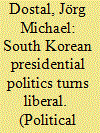

|
|
|
|
|
| Summary/Abstract |
The impeachment of President Park Gyeun-hye on 10 March 2017 saw South Korean politics enter a period of crisis. Her removal from office, the result of an unprecedented mass movement of citizen protests, provided a springboard for the subsequent success of the liberal candidate, Moon Jae-in, in the presidential election of 9 May 2017. This article suggests that political change in South Korea is only possible if actors move beyond the politics of personality, and tackle the structural reasons for the policy failures of recent times. Further, if democracy, a humane economic system and responsive political institutions are going to be developed and nourished, the country's ‘imperial presidency’ needs to be reformed. In particular, the current ‘winner-takes-all’ politics, with the presidency as the main locus of power, needs to be reformed in ways that promote a more balanced political system, increasing the influence of other actors and institutions.
|
|
|
|
|
|
|
|
|
|
|
|
|
|
|
|
|
|
|
|
|